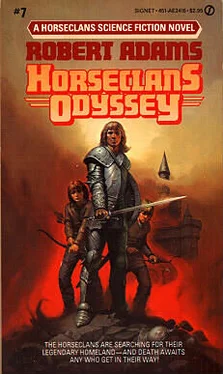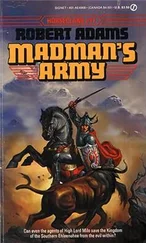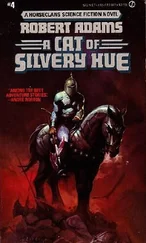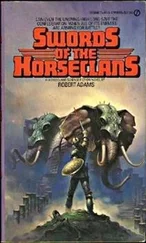Robert Adams - Horseclans' Odyssey
Здесь есть возможность читать онлайн «Robert Adams - Horseclans' Odyssey» весь текст электронной книги совершенно бесплатно (целиком полную версию без сокращений). В некоторых случаях можно слушать аудио, скачать через торрент в формате fb2 и присутствует краткое содержание. Жанр: Фантастика и фэнтези, на английском языке. Описание произведения, (предисловие) а так же отзывы посетителей доступны на портале библиотеки ЛибКат.
- Название:Horseclans' Odyssey
- Автор:
- Жанр:
- Год:неизвестен
- ISBN:нет данных
- Рейтинг книги:5 / 5. Голосов: 1
-
Избранное:Добавить в избранное
- Отзывы:
-
Ваша оценка:
- 100
- 1
- 2
- 3
- 4
- 5
Horseclans' Odyssey: краткое содержание, описание и аннотация
Предлагаем к чтению аннотацию, описание, краткое содержание или предисловие (зависит от того, что написал сам автор книги «Horseclans' Odyssey»). Если вы не нашли необходимую информацию о книге — напишите в комментариях, мы постараемся отыскать её.
Horseclans' Odyssey — читать онлайн бесплатно полную книгу (весь текст) целиком
Ниже представлен текст книги, разбитый по страницам. Система сохранения места последней прочитанной страницы, позволяет с удобством читать онлайн бесплатно книгу «Horseclans' Odyssey», без необходимости каждый раз заново искать на чём Вы остановились. Поставьте закладку, и сможете в любой момент перейти на страницу, на которой закончили чтение.
Интервал:
Закладка:
Full many had been the horrified cries from the noncombatants begging the irreplaceable old man to come back to safety, but he had not heeded them. He had paced on until he stood in the very center of that small, bloody battlefield. Then he had been seen to raise his hands so that his sleeves fell back from his scarred, withered old arms, and then the more sensitive of the mindspeakers there had felt, they later attested, the vague sense of a… a pressure. While horses in the two camps reared and screamed or went running off onto the prairie, while prairiecats not engaged in the fracas yowled and snarled and spat and clawed at empty air and then, finally, slunk off to hide in tents or yurts or in the man-high grasses, Blind Hari of Krooguh had simply stood, as if carved in stone, he and his cat, with blade of axe and saber and spear and heavy dirk flashing and ringing about them.
Then those gathered about felt that arcane pressure increase, increase until it became well-nigh unbearable, until children began to cry and women to scream. The twoscore combats ceased—not slowly or individually, but all at once and suddenly, as if the motive power to swing steel or to lift shield had been abruptly denied every man on that field. Bleeding men simply stood in place, arms at sides, panting with exertion, hands still gripping hilt and haft and shaft and handle, staring into the eyes of recent opponents. Then the pressure had eased slightly and Blind Hari had begun to speak, not loudly, but loudly enough for all to hear. No one afterward seemed to recall his exact words, but only how telling they were. He had spoken of the Sacred Ancestors, of the Undying God-Man who had succored those Ancestors and who had, for more than three hundred years, remained with their own forefathers, teaching, guiding and protecting, giving them law and alliance with horse and cat. He had reiterated the close blood and heritage ties of all the Kindred, every clan, of Ehlai—the Holy City, whence had come the Sacred Ancestors, children, fleeing the War of the Old Gods, which had left them the only true men upon the face of the ravaged land.
He had spoken long of their centuries of bitter conflict with the bestial dirtmen on the verges of the prairies and plains, and of the equally deadly warfare with non-Kindred nomads for control of graze and water. He had reminded them that neither fight was successfully concluded and that since their Undying God had departed them more than ten-score years agone, their only chance of certain survival lay in firm solidarity of the clans, of brotherly love for Kindred brother.
And all at once, whilst the tribal bard still spoke his words of sad admonishment, steel began to ring once more… upon the hard, dusty ground. Prized and trusty weapons were dropped to clatter unheeded as hardbitten veteran warriors, whose bloodshot eyes were suddenly a-brim with tears, clasped hands with or fondly embraced those whom they had So lately been earnestly endeavoring to kill or maim.
At the next tribal council, this tale had gone far and wide among the Kindred clans, adding a luster to the very real awe with which Blind Hari of Krooguh was viewed.
Therefore, at the most recent tribal council—the gathering held every five years—when Blind Hari had sung portions of the familiar “Prophecy of the Return of the Undying.”
“The Song of Ehlai” and “How Strange our Old Lands”, and then had presented Chief Milo of Morai for the benefit of those few who had never before met him, commenting upon how exactly the circumstances of his arrival at the Clan Morguhn camp upon the Brazos had meshed with those prophecies in the old songs, a fevered excitement had been generated and was still spreading. Due to Blind Hari’s immense age, there had been but three in the succession of tribal bards since the departure of the Uncle of the Kindred to seek out his own clan of Undying in some far-off land. So the chiefs could be reasonably certain the three musical renditions of history and prophecy—the most crucial of which was “Prophecy of the Return”—had not been garbled by different bards over many, many scores of winters. Furthermore, upon the summoning of the clan bards to the chiefs’ council, not by more than a single word were any of their renditions different from that of Blind Hari. The tribal bard’s version stated that Ehlai—“by her shining sea”—lay eastward, and a good half of the versions of the clan bards agreed; the others contended that the Holy City lay to the west. The chiefs eventually decided that Hari’s version must be the correct one. Uncle of the Kindred, the Undying God of them all, had not said that he himself would return, only that “one” would return, “from the south, upon a horse of gold”; just so had this Chief Milo arrived, years back, from the south and astride a big stallion of shimmering golden chestnut. The Undying had said that this “one” would be a leader, and this Milo of Morai most assuredly was, and that he would be one of them, and precious few doubted the Kindred antecedents of the Morai. The Undying had added that, with the title of War-Chief-of-the-Tribe-That-Will-Return-to-the-Sacred-Sea, and acting as chief-of-chiefs, this “one” would lead all those clans with unstained honor on a years-long migration back to the ruins of the city of the Sacred Ancestors’ birth to reclaim and rebuild.
The tribal council had dragged on and on, far longer than any other council before it, as the chiefs wrangled and chewed over the issue. At great length, they had all agreed to choose Chief Milo of Moral as their first war chief, to be paramount to all until Ehlai was reached, or Morai died or named a successor, who must then be approved by the council before actually succeeding. All the chiefs felt that this final measure was necessary, for the songs clearly indicated that a score or more of winters might see the tribe still on the move eastward. Therefore, few of them would likely see the Holy City, and, as the Morai seemed to be of at least early middle years, surely he too would become old and infirm before the goal had been achieved. Had he so chosen, War Chief Milo of Morai could have eased the minds of the chiefs, at least on the final measure. For his appearance had not altered by one jot through all the time through which his memory stretched… and that was almost seven hundred years!
Where he squatted on a carpet-covered earthen dais, listening to the circle of squatting chiefs planning and discussing the order of march, this one called Milo kept his thoughts well shielded—a thing always necessary in a camp filled with born telepaths, but especially necessary in his own case. For he thought it best that none, not even old Hari, know for a while that he was in reality none other than their deified Uncle of the Kindred, returned after two centuries of tramping and riding and sailing the wide world in search of an island where, it was fabled, all folk were like himself, ageless and almost immortal. “But I never found it,” he thought ruefully. “Nearly everyone had heard of it in every land I touched, but it was a chimerical quest, for the information I received was always the same. It lay just over the next range of mountains, in the center of the next sea or in a great lake in a great continent beyond that sea.” Deciding at length that he was vainly pur-Suing a mirage, he had begun to retrace his steps, to come back to the only real home and kin he had ever known.
“But haven’t they changed?” he thought on. “Who in’hell would ever have thought that a bare hundred and fifty or so skinny, frightened, starving, sniveling little kids that I found huddled in an air-raid shelter tunneled into a mountainside could have been the progenitors of these fine men and of all the folk they lead?
“They have adapted unbelievably well to a singularly harsh and unrelenting environment Their so-called Sacred Ancestors, during that first spring and summer on the high plains, didn’t even know how to wipe their butts properly without toilet tissue, while these, their descendants, are fully capable of supplying their every need from the land alone. “Well, save perhaps the steel for their weapons and a few tools—but Blind Hari avers that very few of the blades came from the east or the south, most being produced by clan smiths who had dug the metal out of ancient ruins. And that’s another thing, too. Almost all the easterners and southerners with their anthropomorphic gods and their superstitions are scared spitless of the ruins, the so-called God Cities; yet wherever they come across them the clans camp in them—set up their yurts and pitch their tents in the long-dead villages and towns and cities of the late, great United States of America. Nor do they depart until the graze is depleted, or the game, or the diggings are not producing enough in the way of metals or useful artifacts to make the labor worthwhile, or until they just feel the urge to move on. Worshiping, as they do, only Sun and Wind and, to a limited extent, their swords and sabers—this last a rite that seems to have filtered in from the east in the last two hundred years, for I never founded it—these clansfolk harbor hardly any of the debilitating, gruesome superstitions to which most folk in this land and overseas seem addicted, and so they do not fear the supernatural.
Читать дальшеИнтервал:
Закладка:
Похожие книги на «Horseclans' Odyssey»
Представляем Вашему вниманию похожие книги на «Horseclans' Odyssey» списком для выбора. Мы отобрали схожую по названию и смыслу литературу в надежде предоставить читателям больше вариантов отыскать новые, интересные, ещё непрочитанные произведения.
Обсуждение, отзывы о книге «Horseclans' Odyssey» и просто собственные мнения читателей. Оставьте ваши комментарии, напишите, что Вы думаете о произведении, его смысле или главных героях. Укажите что конкретно понравилось, а что нет, и почему Вы так считаете.












